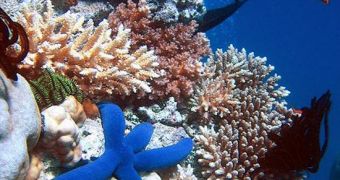Listening to coral reefs can apparently be used as a method of keeping tabs on the health of both corals and other marine species living in or around them, a new scientific investigation shows.
The conclusion belongs to a report that was released by the University of Bristol's School of Biological Sciences, and authored by professor Dr Steve Simpson. The investigation was published in the latest issue of the esteemed journal Science.
The group is working in Panama, keeping tabs on coral reefs and the populations of fish and other marine creatures living in the ecosystems.
One of the main assumptions the study made was that the increased levels of activity in coral reefs, caused by moving fish and so on, should be a clear indicator of the health of that particular ecosystem.
In other words, the amount of noise the team picked up was directly linked to the number of species present around the reefs, which in turn is an indicator of their health.
According to the Bristol research team, it would appear that the size and composition of the resident community makes each coral reef different from the other, when the noise they produce is analyzed.
Fish and invertebrate species produce a variety of noises, including clicks and grunts, which combine to produce cacophonies that specialized microphones can easily pick up.
The investigators that conducted the new work listened in on reefs at the Las Perlas Archipelago, in Pacific Panama, and determined that variations in noise levels could be associated with a reef's health status.
The primary conclusion of the work was that healthy reefs are a lot louder than those that had corals which were in poor health. The latter category also had fewer fish and invertebrate species living nearby.
“This study provides evidence that reef generated sound contains a real richness of information,” Simpson argues.
“This would provide fish and invertebrates with the cues they need to assess the quality of potential settlement sites before they can see them, a bit like wandering around a music festival eavesdropping on different bands before choosing where to pitch your tent,” he goes on to say.
“It may even provide the information that enables some fish to return to the very reef on which they were originally spawned,” Simpson adds.
The recent investigation was funded by the Natural Environment Research Council (NERC) of the United Kingdom.

 14 DAY TRIAL //
14 DAY TRIAL //